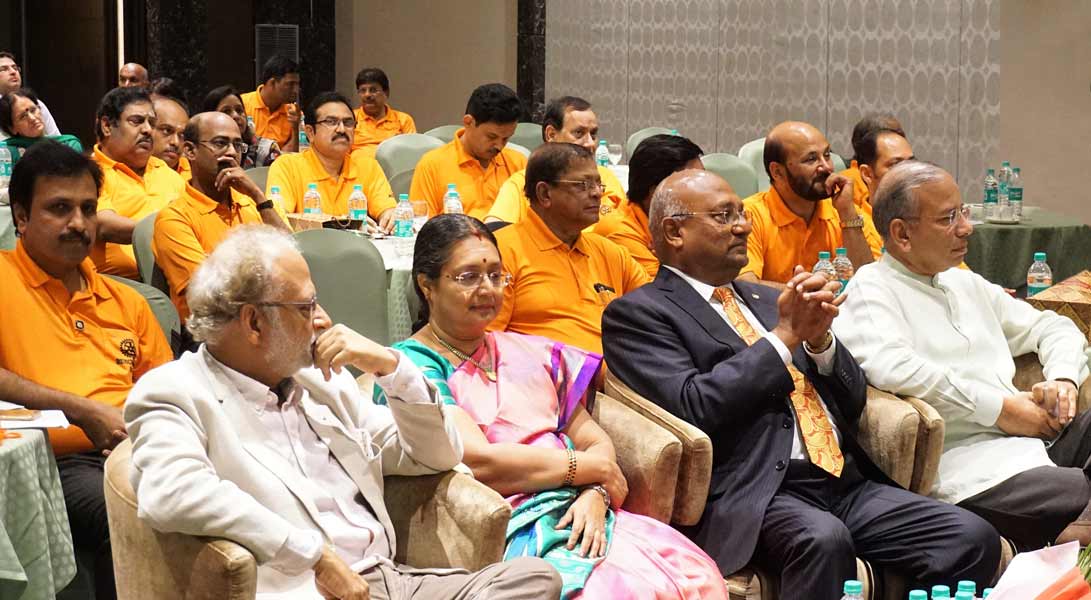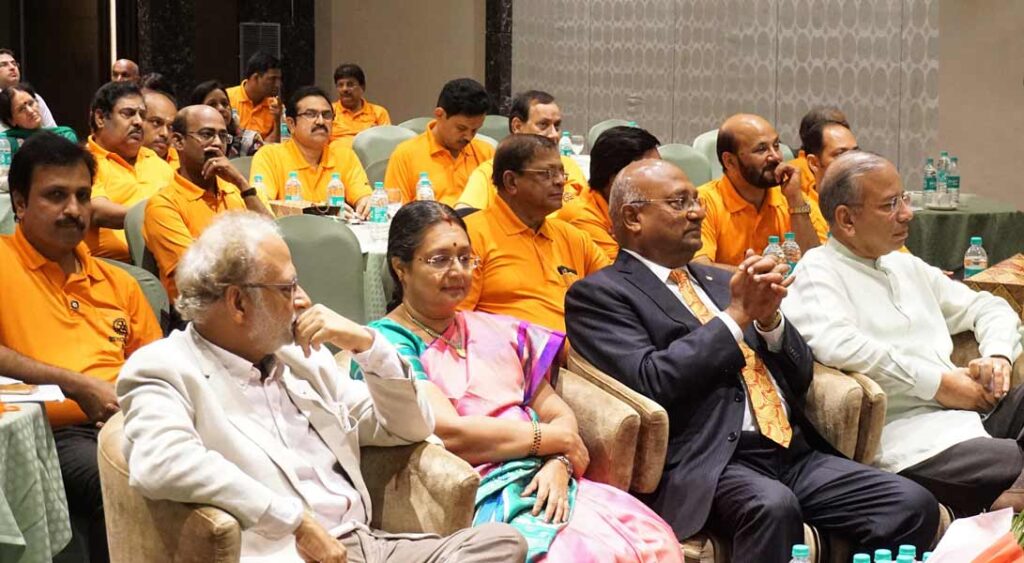I often think of my year as President of my club way back in 1987, perhaps the most enjoyable assignment I have ever had, and in retrospect, I know that this was a turning moment of my life for it set me up for everything else in Rotary that lay ahead of me.”

Addressing the next batch of District Governors (for 2018–19) at one of the meetings of a multiple training session in Delhi for district leaders, PRIP K R Ravindran left them with one central thought — Rotary is made in the clubs, not at the district or even RI headquarters in Evanston. He recalled a quote he had picked up from his college rugby team — “The size of your success is measured by the strength of your desire, the size of your dream and how you handle disappointment along the way.”
Good club presidents or DGs should use such a principle in running their clubs/districts. Before putting pressures and demands on the clubs such as raising more money for TRF, adding more members, doing better projects etc, “remember your days as a club president, and that each club will have its day-to-day issues, apart from the pressures you place on them. And, if you ask too forcefully, or far too much, you will drive away members.”
Even while asking clubs to look for younger members, DGs should counsel club leaders not to alienate “the older members who now form our backbone, or lose sight of the recently retired who still have so much to give,” said Ravindran.
Rotary is indeed a business. Our business is literacy and health; livelihood and hope; and to so many of those we help, our business is miracles.
– PRIP K R Ravindran
If such sensitivities and skills were used appropriately, “you can not only accomplish much and reach many people, but also elevate Rotary to a different level.”
Good projects will get funding
Ravindran told the DGEs who listened to him in rapt attention, that during his Rotary journey and different leadership positions, he had “learned that raising big money is never an issue if you have a good project, and run it in a professional manner.” A good test was the “schools project we ran in Sri Lanka — building 25 modern, fully equipped schools after the tsunami. The projected cost was $12 million; we raised it in 10 months and completed all the schools within three years and most of the money came from non- Rotary entities.”
Similarly, in the initial stages of the PolioPlus movement in the mid-1990s, Sri Lanka needed $5 million to do a full NID. Of this, $1.5million came from TRF; “we raised the balance in one meeting at the Ministry of Health office with an audience of five — the Ambassadors of Japan, US, UK and WHO and UNICEF representatives,” Ravindran said.
Urging the DGEs to remember that our time on this earth is finite, he asked them to use their one year in office most productively, wisely, thoughtfully and generously and advise their club presidents to do the same and bring in the full force of their talents to make a difference as only Rotary can. “Remember a new year awaits you, full of promise: a new chapter in the book of our lives, its pages empty, waiting to be filled.” It was up to each of them to ensure that this chapter was either filled with “generous deeds, responsibility, work done well, and a life well lived; or days that follow one another, each one alike, unremarkable.”

The past RI President also reminded the DGEs that while popularity is temporary, respect is perennial. “Virat Kohli is popular. If he fails to score for one season the same crowd which adored him will boo him! That is popularity. President Abdul Kalam won respect. That he took to his grave and then to eternity. That is respect.”
He also asked them to always follow the principle that never speak from the podium “what you don’t practice yourself. Always walk the talk. Otherwise you will be no better than a politician.”
Ravindran recalled that as RI President he had always insisted that Rotary must be run like a business. “And to those who said to me, but Rotary is not a business, I said, yes, it is. But it is a business like no other. Our business is literacy and health; livelihood and hope; and to so many of those we help, our business is miracles.”
So as DGs they would have to tell their presidents that they had just one year to transform lives and “build monuments that will endure forever — carved not in granite or marble, but in the lives and hearts of generations. Tell them we are the ones who can make it happen. This is our time; it won’t come again, so let us grasp it.”
In another meeting, Ravindran urged the freshly minted batch of 2017–18 District Governors, to “approach the practical duties of Rotary administration with the same zeal and standards you apply in your professional lives.”
Give maximum benefit to members
He said as CEO of his company, he made every decision to get maximum benefit to his shareholders, with zero compromise of ethics. So why should it be different for Rotary, he asked. “Everything we do as Rotary leaders, every decision we make, must be for the benefit of the members whom we represent and who have placed their confidence in us. The same efficiency and the same productivity that we look for outside of Rotary, must also be uncompromisingly sought within Rotary, by every single Rotarian,” he said.
Surround yourself with the best people you can find, and empower them to do their jobs. Do not pick people based on friendship or favours owed, or because they helped you in your elections.
But giving their best to Rotary during their year as DGs was not enough. Accountability was very important; “each of you is being paid a very reasonable allowance. This comes from the money that Rotarians pay as dues.
They have a right to expect good value for that money.”
Also, they should always remember that their RI Director was organising such events at a cost that was again being paid by Rotary members. “We need to show a good return on their investment, and that return should be measurable in terms of increased membership, or Foundation giving, or media placements.”
And to get these results a sound management principle was “to surround yourself with the best people you can find, and empower them to do their jobs. I hope you have done so and not merely placed people who helped you in your elections. Please do not pick people based on friendship or favours owed.”
On the contrary, they should look for top professionals and experts their clubs had on offer and induct them into their teams, especially in areas such as strategic planning, communications and finance.
Ravindran urged the DGs to make effective use of the resources that RI had put together for their benefit, including Rotary Club Central and also educate their clubs on the benefits Rotarians could get by using Rotary’s Global Rewards, which offered Rotarians discounts and offers from reputed services, establishments, and organisations around the world.
In a nutshell, what was expected from them was “good governance, accountability and efficiency”; by ensuring these they would set the right example for the entire Rotary world, he concluded.






